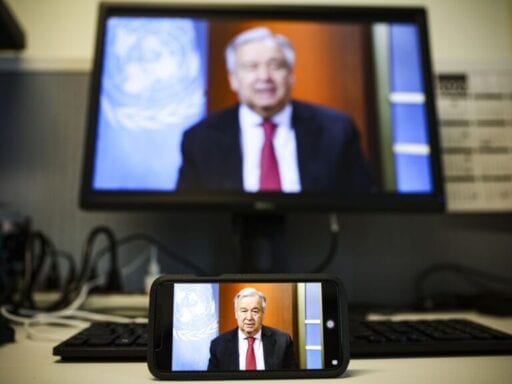UN Under-Secretary-General Fabrizio Hochschild calls for an immediate global “digital ceasefire” during the pandemic.
With the world focused on combating the Covid-19 pandemic, United Nations Secretary-General António Guterres called for an immediate global ceasefire of armed conflict. The virus, he said, “does not care about nationality or ethnicity, faction or faith. It attacks all, relentlessly.”
The call has been endorsed by an ever-growing number of countries and some 70 regional partners, civil society organizations, and all UN Messengers of Peace and Advocates for the Sustainable Development Goals. We have also seen more than 1 million people worldwide take citizen action in support of the Covid-19 ceasefire appeal.
This is encouraging impact. But to be truly successful in our efforts to curb Covid-19, we must also strive to uphold this ceasefire in the digital world as well.
Consider that in the month of March alone, hospitals, medical facilities, government health agencies, and testing centers, and even the World Health Organization (WHO) have faced targeted cyberattacks perpetrated by criminals and other malicious actors. The purpose of these crimes, it can be assumed, is to undermine our Covid-19 response capabilities.
In the case of the WHO, a place that much of the world depends upon for accurate and timely public health information and support to national responses, the threat was reported as unsuccessful. Yet the WHO chief information security officer sounded a warning: The pace and number of these threats have increased considerably.
Let’s be clear: Attacks in the digital domain are in many ways tantamount to physical ones.
Digital technology now underpins core societal functions and infrastructure, including supporting access to food, water, housing, energy, health care, and transportation. When launched successfully, digital attacks are catastrophic and can lead to loss of life.
The UN secretary-general’s call for a global ceasefire is about protecting the most vulnerable among us. If authorities in the most developed and peaceful countries are struggling to manage, how can health systems and frontline organizations operating in war-torn countries possibly be prepared to cope with a potential attack to their digital infrastructure during a pandemic?
And how can we ask our health care workers, diagnostic and treatment facilities, researchers, and hospitals — those bound by the selflessness of duty and banded together against a common, hidden enemy — to continue containing the crisis while questioning whether vital equipment may be affected or shut down by a digital attack?
Covid-19 has massively accelerated the digitalization of society, at least in those countries that enjoy high rates of internet connectivity. We are also witnessing firsthand how digital technology has been essential in keeping economies and societies functioning through facilitating remote work and learning, and in keeping us virtually connected in a time of physical and social distance.
We rely on digital cooperation more than ever before, and as such, we are at a critical inflection point as a global society. Maintaining and ensuring trust and security in the digital world during this global health crisis is imperative. The responsible use of technology must be protected through better international cooperation.
We must commit to an immediate digital ceasefire, and governments, civil society groups, and the private sector must set the tone. Without this step, our global response to the pandemic will be weakened.
We are living in uncertain and unprecedented times. The UN secretary-general has called on the world to respect a global ceasefire so that we can come together, in solidarity to face this human crisis. To save lives, that obligation should extend to the digital domain.
Fabrizio Hochschild is under-secretary-general at the United Nations and special adviser to the secretary-general, working on digital cooperation issues.
Author: Fabrizio Hochschild
Read More



